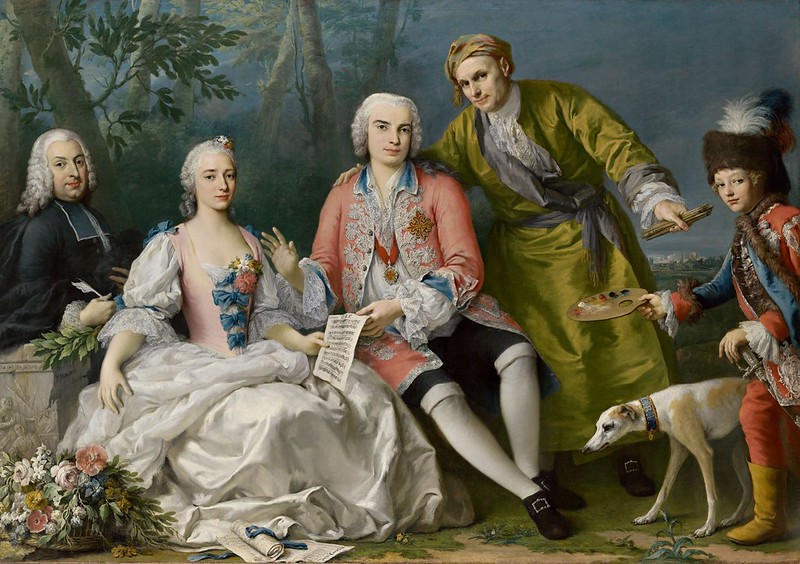Egidio Romualdo Duni (1708-1775)
- Les moissonneurs (1768)
Performers: Anna Mikołajczyk-Niewiedział (soprano); Patryk Rymanowski
(baryton); Lukasz Wilda (tenor); Anna Podgórska (soprano); Eryk
Rymanowski (baryton);
Accademia dell'Arcadia; Bartlomiej Stankowiak (conductor)
Further info: Duni - Les moissonneurs
---
Italian composer. Duni was the fourth son of Francesco Duni, maestro di
cappella in Matera, and the younger brother of Antonio Duni
(c.1700-1766). Little is known of his early training, which took place
in Naples, though probably not with Durante as has previously been
supposed. Nerone, his first opera, was staged during the Rome spring
season of 1735, and after composing works for Rome and Milan in Carnival
1736 Duni went to London, where his Demofoonte was performed in an
English version in May 1737. He matriculated at Leiden University on 22
October 1738 and went on to write further operas for Milan in 1739 and
for Florence in 1740 and 1743. On 16 December 1743 Duni was appointed
maestro di cappella of S Nicola in Bari. With Ipermestra and Ciro
riconosciuto (both 1748, Genoa), he came to the attention of the Duke of
Richelieu and Philip, Duke of Parma. Soon after, he became court
maestro di cappella in Parma and music teacher to the duke’s daughter
Isabella (who later married Archduke Joseph of Austria). With Olimpiade
(Parma, 1755) Duni’s career as an opera seria composer came to an end,
while Goldoni’s arrival in Parma in May 1756 led to his collaboration on
Duni’s last Italian opera, La buona figliuola, better known through
Piccinni’s later setting. The French atmosphere of the Parma court
turned Duni’s attention to the opéra comique, and he is often said to
have written, during his stay there, the music for two Favart librettos
in that genre, La chercheuse d’esprit and Ninette à la cour. This is
highly doubtful in both cases (nor has it been proved that any of Duni’s
music was used in the pastiche Ninette à la cour, 1755). However, Jean
Monnet, director of the Paris Opéra-Comique, reported in his memoirs
that in autumn 1756 he received a request from Parma for a French
libretto for Duni, who wished to write an opera for Paris. The result,
after hesitation on Monnet’s part, was Louis Anseaume’s Le peintre
amoureux de son modèle, for the first performance of which on 26 July
1757 Duni went to Paris.
This was a brilliant success and refuted Rousseau’s claim that the
French language was unsuitable for music: with its blend of vaudeville
tunes and natural French expressive declamation within an Italian
musical idiom, Le peintre served for several years as a model opéra
comique. Released with a pension from his post in Parma, Duni settled in
Paris, married and, during 1758-60, strengthened his reputation with
several successful opéras comiques. In 1761 he was appointed music
director of the Comédie-Italienne but, ironically, a number of his new
works for that theatre were not well received. In August 1761 he
indignantly replied in the Mercure de France to hostile criticism of his
La bonne fille, and a private letter dated January 1762, published by
Tiersot, reveals that he was also in conflict with Favart at this time.
However, his collaborations with Anseaume – Mazet (1761), Le milicien
(1762) and Les deux chasseurs et la laitière (1763) – were extremely
successful. These works, as well as two ambitious collaborations with
Favart, La fée Urgèle (1765) and Les moissonneurs (1768), were published
in Paris and adapted, translated and imitated all over Europe. They
held the stage in France until nearly the end of the century. During the
18 months between the première of La clochette in July 1766 and that of
Les moissonneurs in January 1768, Duni apparently made a visit to
Italy. On his return to Paris he met with Grimm’s harsh and unjust
suggestion that he ‘would do well to give up composition since his trip
to Italy had not refreshed his head’. Despite similar but milder
criticism, Duni’s next work, Les sabots (1768) – the first of two
collaborations with Sedaine – had a modest success, and on 26 November
1768 both he and Favart were given pensions by the Comédie-Italienne.
After Thémire (1770) he retired, continuing to teach and occasionally to
judge musical competitions. Duni’s son, Jean Pierre Duni (1759-?), was
the composer of a set of three keyboard sonatas with violin
accompaniment (Paris, 1778).

Cap comentari:
Publica un comentari a l'entrada